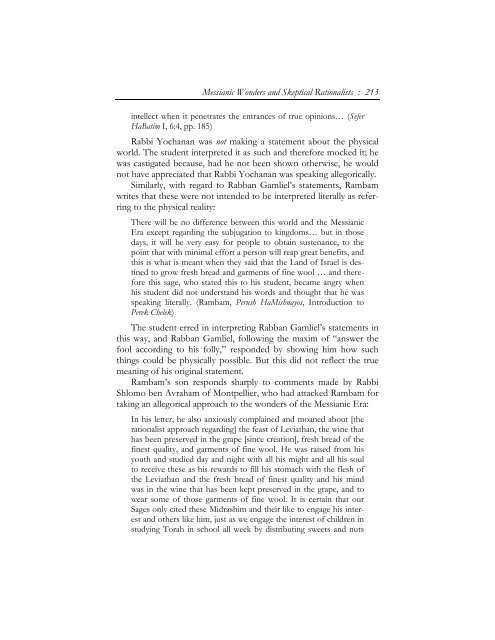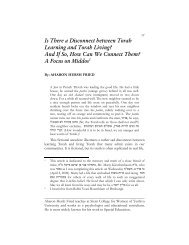Messianic Wonders and Skeptical Rationalists - Hakirah.org
Messianic Wonders and Skeptical Rationalists - Hakirah.org
Messianic Wonders and Skeptical Rationalists - Hakirah.org
You also want an ePaper? Increase the reach of your titles
YUMPU automatically turns print PDFs into web optimized ePapers that Google loves.
<strong>Messianic</strong> <strong>Wonders</strong> <strong>and</strong> <strong>Skeptical</strong> <strong>Rationalists</strong> : 213<br />
intellect when it penetrates the entrances of true opinions… (Sefer<br />
HaBatim I, 6:4, pp. 185)<br />
Rabbi Yochanan was not making a statement about the physical<br />
world. The student interpreted it as such <strong>and</strong> therefore mocked it; he<br />
was castigated because, had he not been shown otherwise, he would<br />
not have appreciated that Rabbi Yochanan was speaking allegorically.<br />
Similarly, with regard to Rabban Gamliel’s statements, Rambam<br />
writes that these were not intended to be interpreted literally as referring<br />
to the physical reality:<br />
There will be no difference between this world <strong>and</strong> the <strong>Messianic</strong><br />
Era except regarding the subjugation to kingdoms… but in those<br />
days, it will be very easy for people to obtain sustenance, to the<br />
point that with minimal effort a person will reap great benefits, <strong>and</strong><br />
this is what is meant when they said that the L<strong>and</strong> of Israel is destined<br />
to grow fresh bread <strong>and</strong> garments of fine wool … <strong>and</strong> therefore<br />
this sage, who stated this to his student, became angry when<br />
his student did not underst<strong>and</strong> his words <strong>and</strong> thought that he was<br />
speaking literally. (Rambam, Perush HaMishnayos, Introduction to<br />
Perek Chelek)<br />
The student erred in interpreting Rabban Gamliel’s statements in<br />
this way, <strong>and</strong> Rabban Gamliel, following the maxim of “answer the<br />
fool according to his folly,” responded by showing him how such<br />
things could be physically possible. But this did not reflect the true<br />
meaning of his original statement.<br />
Rambam’s son responds sharply to comments made by Rabbi<br />
Shlomo ben Avraham of Montpellier, who had attacked Rambam for<br />
taking an allegorical approach to the wonders of the <strong>Messianic</strong> Era:<br />
In his letter, he also anxiously complained <strong>and</strong> moaned about [the<br />
rationalist approach regarding] the feast of Leviathan, the wine that<br />
has been preserved in the grape [since creation], fresh bread of the<br />
finest quality, <strong>and</strong> garments of fine wool. He was raised from his<br />
youth <strong>and</strong> studied day <strong>and</strong> night with all his might <strong>and</strong> all his soul<br />
to receive these as his rewards to fill his stomach with the flesh of<br />
the Leviathan <strong>and</strong> the fresh bread of finest quality <strong>and</strong> his mind<br />
was in the wine that has been kept preserved in the grape, <strong>and</strong> to<br />
wear some of those garments of fine wool. It is certain that our<br />
Sages only cited these Midrashim <strong>and</strong> their like to engage his interest<br />
<strong>and</strong> others like him, just as we engage the interest of children in<br />
studying Torah in school all week by distributing sweets <strong>and</strong> nuts
















